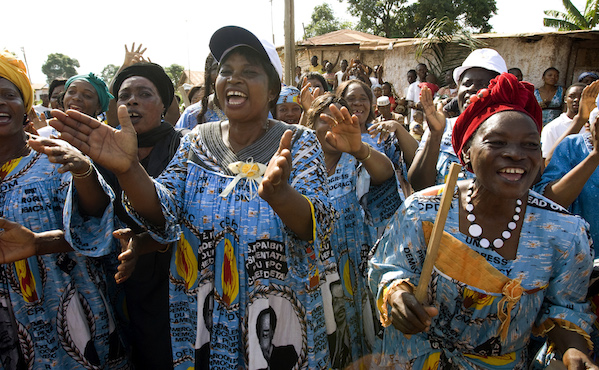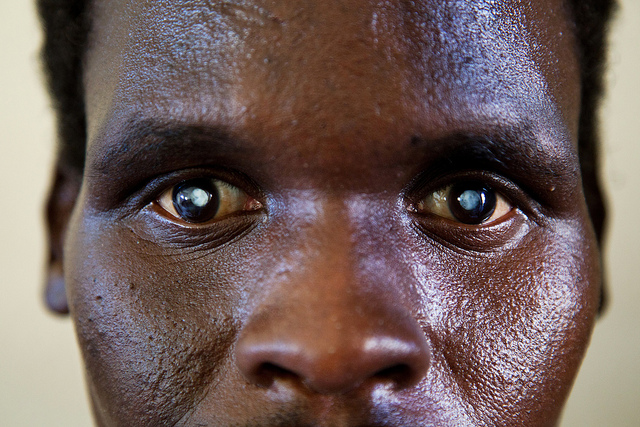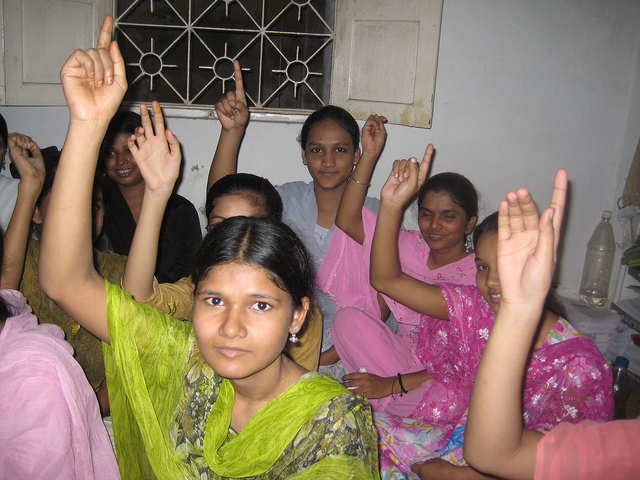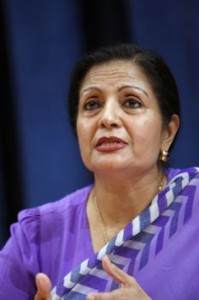According to World Bank data, amongst the 115 low-income countries of the world, the proportion of people in extreme poverty (that is, with an income of US$1.25 [...]]]>
According to World Bank data, amongst the 115 low-income countries of the world, the proportion of people in extreme poverty (that is, with an income of US$1.25 per day per person, adjusted for purchasing power parity) declined from 43.4 percent in 1990 to 17 percent in 2011.
In other words, 912 million people were lifted out of extreme poverty over the past two decades.
This drop was mainly concentrated in East Asia and the Pacific, where the incidence of extreme poverty was reduced from 57 to 7.9 percent during the same period (i.e. 750 million people). In Southeast Asia, it dropped from 54.1 to 24.5 percent (221.5 million people).
In Latin America and the Caribbean, between 1990 and 2011, the incidence of extreme poverty dropped from 12.2 to 4.6 percent, meaning that 25.5 million Latin Americans no longer live in this extreme condition.
Two decades ago, poverty was defined in monetary terms, based on a consensus around the concept that income was an adequate measure to represent wellbeing.
Today, it is more commonly understood that well-being is something that must be seen within a wider perspective. Poverty must be understood by identifying deprivations in factors that go beyond personal income.
In the international arena, perhaps the most significant progress made in this regard has been the increased use of the notion of multidimensional poverty. With more or less detail, it is often measured based on nutrition and infant mortality, years of schooling and school attendance, type of housing and access to the basic supplies that this entails, as well as the ownership of basic assets.
In September of next year, the member states at the United Nations will decide on the new global agenda for development. At the moment, the proposal that is most likely to be accepted on poverty includes the goal that, by 2030, extreme poverty as set by poverty-line income threshold of US$1.25 per day will have been completely eliminated, and the proportion of people living in poverty – in all its dimensions according to the different definitions used in each country – will be halved.
From an optimistic perspective, this proposal implies that many countries have already started to take an important step towards a new way of thinking and furthering the wellbeing of individuals, and that many other countries will also do so in the near future.
Tell us – beyond income, what other material dimensions of well-being should also be considered?
*Alfredo González Reyes is an UNDP specialist on poverty and human development in Latin America and the Caribbean @UNDPLAC @pulpogonzalez www.latinamerica.undp.org
]]>I think that it is crucial to take local priorities as the starting point for development co-operation.
Let me give you a very concrete example of why this is important. As mayor of Bagangté Municipality in Cameroon, I developed a project to [...]]]>
I think that it is crucial to take local priorities as the starting point for development co-operation.
Let me give you a very concrete example of why this is important. As mayor of Bagangté Municipality in Cameroon, I developed a project to provide drinking water to my citizens. With support from the International Association of Francophone Mayors, we built a well and held a large campaign to explain the need for citizens to pay taxes to ensure long-term sustainability of the drinking water system.
This was working well, and access to water was increasing. Then all of a sudden, our central government decided to launch a project in my region to provide free drinking water to citizens. This would cancel out all our efforts! I therefore told the government that we already had a programme to provide my people with water access and that this new project was unnecessary and potentially unsustainable in the long term. I am convinced that charging citizens for a service makes them take better care of the network, and ensures long term sustainability, as maintenance will be easier when people feel that the service belongs to them because they pay for it. I explained that if the central government wanted to invest in my community, their support for access to electricity would be far more useful. This example is a typical one.
Unfortunately, the Ministry refused to change or transform their project to improve the existing network.
As a Champion on Development Co-operation for the global organisation of United Cities and Local Governments, a function shared with eight other mayors from around the world, I aim to increase recognition of local governments’ role in development. I see it as my task to feed lessons from my local reality into international discussions on making development co-operation more effective, coherent and accountable.
Local governments are on the front line of dealing with development challenges, and identifying solutions to them. It is only natural that they take a leading role in the elaboration of development strategies for their areas. A formal consultation mechanism should ensure that these are included in national development strategies. What’s more, local governments and their associations should be supported to have the capacity to engage in this dialogue.
Local government development co-operation as effective solution
Let me get back to my example from Cameroon. Our well project was supported by an association of local governments from abroad, with help from experts from other local governments that knew the kind of services we deliver and how to do this effectively. This helped to make the project a success. This “decentralised development co-operation” had a high degree of ownership and local traction, based on my local government’s priorities.
This kind of co-operation between peers is based on long-term relationships, resulting in trust, transparency and good dialogue between partners. This is very important to achieve sustainability. It can be done in a very cost-effective manner since the co-operation initiatives build on the existing local governments themselves and use existing staff within the municipal organisations. This avoids the need to set up parallel structures that could lack the political leadership of the partner itself.
The cost of not working with local governments
Strengthening local governments is crucial to achieve development goals. A top down approach by central government can result in development policies ill-adapted to local needs and contexts. Development partners such as multilateral organisations, states, and civil society should understand that the cost of not working with local governments may be high, missing local ownership, as seen in the case of the water project in Bagangté.
For a start, their action might not be sustainable when not embedded into a local public policy designed to meet the needs of the citizen. Embedding development priorities in local public policy ensures their continuation and follow up because municipal policy is attached to a concrete workplan with a budget. This bottom up process is very important.
There may also be duplication of work at local and national levels, with a risk of confusion on the mandates of different levels of government. Bypassing local government may also generate distrust among citizens.
I believe that local government development co-operation initiatives can provide national governments with a broad range of experiences to help them respond to issues, challenges or disasters that have effects at the local level. It is crucial that local governments become true partners in national dialogues on development priorities, policies and strategies.
It is also important that reviews of development co-operation commitments such as the Busan commitments give more attention to the role of local governments in national debates on development priorities and implementation. It is good that UCLG is back on the Global Partnership for Effective Development Co-operation’s Steering Committee.
I think UCLG should also explore, within the Global Partnership, how the post-2015 development goals will be implemented. It is in this regard important that more focus is placed on who can help achieve which goals, as opposed to just focusing on what should be achieved.
I hope that together we can ensure that the level of government closest to citizens, becomes more equipped to address the upcoming new set of development goals, which should be in line with our own priorities at the local level.
This article is published with the assistance of the Global Partnership for Effective Development Co-operation, more expert comment is available at http://devcooperation.org.
]]>The potential for this to change the lives of people with disabilities living in poverty around the world should not be underestimated.
People with disabilities have been left behind
Around one [...]]]>
The potential for this to change the lives of people with disabilities living in poverty around the world should not be underestimated.
People with disabilities have been left behind
Around one billion people—or 15 percent of the world’s population—have a disability, and in many countries they are among the most excluded and hardest to reach of all groups in their community.
In 2000 world leaders agreed on an ambitious development framework consisting of eight Millennium Development Goals (MDGs). In the 14 years since those goals were set, we have seen some of the most important steps towards poverty elimination in, child deaths have fallen by more than 30 percent and deaths from malaria have fallen by one quarter.
One critical group, however, has been largely left out from this progress.
Almost 14 years on, the exclusion of disability from the MDGs has materially affected many people with disabilities as well as their families. They are less likely to have access to healthcare and education, and in turn find making a livelihood and escaping poverty that much more difficult, if not impossible.
Fifteen-year-old Nabirye from Uganda lost her sight aged nine, following an infection, and had to drop out of her school immediately as it didn’t have the equipment or teachers needed to support students with disabilities such as hers.
“I felt so bad leaving school. Now I don’t do anything, I just stay at home. When I was at school I liked science and English, I wanted to be a lawyer, but I have been a long time out of school now so I don’t think I can anymore.”
At 15 years old, she still has enormous potential, but with every day out of education a bit more of it is lost.
In 2015 a new development framework will be agreed by current world leaders, replacing the MDGs.
Last month the World Bank President, Dr. Jim Kim, spoke about the opportunity this generation has to end extreme poverty – within a generation. For those of us in international development, that’s inspiring but not achievable if people with disabilities continue to be excluded from development policy and process and don’t have a say in the issues that affect them.
And that is why the recommendations by the IDC on how the UK government, a leading development donor, develops its policies and spends its money are so critical.
DFID must seize this opportunity to lead the way on inclusive development
The work of the government’s Department for International Development (DfID) on disability and development has never before received such scrutiny from parliament and it is over a decade since the UK government announced new policy in this area.
If the opportunity presented by the select committee report is missed, it could be years before disability and development will receive this level of political attention again – leaving another generation excluded.
As a leading aid donor, the UK has a unique opportunity to influence the setting of the next global development goals, which will shape the lives of people for more than a generation. But to do this effectively the government needs to lead by example and ensure that UK aid is fully inclusive of people with disabilities.
In 2000, DfID broke new ground by being the first bilateral agency to explicitly address the link between poverty and disability. Yet, despite being an early champion of disability as a development issue, no concrete policy has since been formulated. The select committee’s inquiry identified this gap and was clear that what’s needed to reach the world’s poorest people was a ‘disability strategy with clear targets and timescales’. This echoes the campaign call of Sightsavers’ Put Us in the Picture campaign.
Solutions to inclusion
We recognise that inclusion is not an easy task. Detailed analysis is required in order to effectively target people with disabilities and ensure that they are not excluded from development policies and programmes. This is a challenge both governments and development agencies face.
As part of our support to this process, Sightsavers is piloting a project to disaggregate data by disability in Africa and Asia. This will help us understand how development programmes really can include those most in need and are delivering demonstrable results.
Another critical issue is that people with disabilities rarely have a voice in the development decisions that affect their lives. To address this there needs to be real and sustained engagement between aid agencies, as well as people with disabilities and their families. DfID must ensure disabled people participate fully in the design and delivery of its programmes.
The value of this is demonstrated by the work Sightsavers is doing through the Voices of the Marginalised pilot project, which aims to bring the perspective of those living with disabilities, through participatory research, into global decision-making processes.
Will we take this opportunity to act now?
The committee’s report offers hope and promise to people with disabilities around the world who do not currently have a voice in or benefit from UK aid.
However, this promise will remain unfulfilled if the UK Government does not come out with a positive, ambitious response that commits to prioritising people with disabilities in its development work through the implementation of a disability strategy.
We need to build on the progress that has been made so far and show leadership. We need to ensure the plans we put in place now, and which will impact on the lives of people globally for years to come, leave no one behind. We need to seize this opportunity or face letting down another generation.
 Dominic Haslam is Director of Policy and Strategic Programme Support for the development charity Sightsavers, which works in more than 30 developing countries to prevent blindness, restore sight and advocate for social inclusion and equal rights for people with disabilities www.sightsavers.net. He also sits on the steering committee of the Beyond 2015 Campaign.
Dominic Haslam is Director of Policy and Strategic Programme Support for the development charity Sightsavers, which works in more than 30 developing countries to prevent blindness, restore sight and advocate for social inclusion and equal rights for people with disabilities www.sightsavers.net. He also sits on the steering committee of the Beyond 2015 Campaign.
Jointly sponsored by UNDP and OECD, the High-Level Meeting intended to demonstrate progress towards truly global partnerships between governments, business and civil society in making development co-operation more effective and sustainable. But opening remarks by leaders of the two sponsoring agencies and the plenary panel discussion seemed largely focused on ‘aid effectiveness’. Concepts of risk management, improving public finance management and procurement systems of recipient countries, predictability of aid flows and monitoring results to report to donor countries’ parliaments were the main discussion points. Progress on these aspects seemed to be the dominant concern of sponsors and panellists.
In break-out groups, aid continued to be the focus around which issues of ownership, transparency and partnerships were being constructed and realised.
As a delegate from India –now a large middle-income country (MIC) with high levels of poverty, despite its rapid economic growth during the past decade– these conversations seemed to me somewhat irrelevant and dated. Instead, critical issues of malnutrition, violence against women, social inclusion and sustainable livelihoods need to be tackled in India through improved democratic governance, transparency and accountability. Domestic resources are adequate for addressing these issues in my country, but they are not deployed in an efficient and productive manner.
This significant gathering in Mexico of over 1,500 delegates from around the world raised important questions for the future of development co-operation. Is a new global partnership being constructed around the old issues of ODA? Are lingering concerns of aid effectiveness from Paris and Accra still unresolved 30 months after Busan? Will a new age of development co-operation be able to break free from previous ODA (Official Development Aid) frameworks? Will new actors in the development arena — large emerging economies such as the BRICS (Brazil, Russia, India, China and South Africa) and other middle income countries– find resonance of their principles and aspirations in future debates? How will local level ground-up partnerships define contextually appropriate development effectiveness, without reference to global actors?
Various focus sessions and plenary presentations during the two-day conference demonstrated several shifting trends. First, emphasis on effective development co-operation was reiterated as an important shift away from Busan. But it was not clear how the effective co-operation framework and indicators would differ from the old ‘aid effectiveness’ paradigm in practice.
Second, inclusive multi-stakeholder partnerships involving governments, civil society, business and thinktanks were agreed to be crucial to achieveing effective development co-operation. What remains ambiguous is how unequal power relations between stakeholders can be handled for meaningful co-operation.
Third, speakers acknowledged the distinctive and unique nature of South-South co-operation, while also aspiring for triangular North-South-South co-operation approaches.
Finally, there was welcome attention to the strengths and development challenges of the MICs. As the president of Mexico reminded the audience, countries like his are both recipients and providers of development assistance and hence able to better empathise with other developing countries.
Non-state actors are becoming more relevant in promoting development effectiveness and civil society organisations from many larger MICs have long worked in solidarity with their counterparts in other developing countries. Now, businesses and thinktanks are also becoming important non-state actors in promoting South-South development co-operation.
The Rising Powers in International Development Programme, hosted by the UK Institute of Development Studies (IDS), is working to build an evidence base around the role of rising powers in international development, producing new thinking and practical guidance on engagement and mutual learning.
The programme’s global delegation attended the Mexico meeting to share lessons from non-state actors’ contributions in the emerging Global Partnership for Effective Development Cooperation and we will continue to strengthen civil society contributions through the new Future International Co-operation Policy Network.
Beyond demanding transparency and accountability around the aid that their own countries still receive, we’ve found that civil society organisations from MICs can add significant value to other countries’ development cooperation. From the four case studies we presented at the High-Level Meeting, we derived four important lessons for taking forward principles and mechanisms of civil society-led South-South Development Cooperation (SSDC).
Firstly, solidarity and trust between cooperation partners can lead to more focused civil society-led South-South cooperation and mobilise broader coalitions for common causes.
Secondly, because civil society-led South South cooperation aspires to be more flexible and adaptable than traditional North-South donor realtionships, it avoids intrusive conditions and creates space for innovation.
Thirdly, a multi-stakeholder approach is essential to ensuring sustainability.
Finally, new methods of measuring SSDC need to be explored to capture the complex effects of civil society-led transnational initiatives.
Alongside governments and businesses, CSOs have been developing innovative practices to contribute to the global struggle against poverty. They have considerable experience and great potential of sharing these practices internationally as well as at home, and their important contributions should not get lost in the state-to-state negotiations that can often become the focus of global initiatives such as the Global Partnership.
—-
Rajesh Tandon is the Founder and President of Indian civil society organisation Participatory Research in Asia (PRIA) and a member of the Future International Cooperation Policy Network.
]]>
In an attempt to engage with the world’s population, a team headed by the United Nations Millennium Campaign is polling individuals across the globe and making those results available to [...]]]>
In an attempt to engage with the world’s population, a team headed by the United Nations Millennium Campaign is polling individuals across the globe and making those results available to everyone, including U.N. decision makers.
The initiative, called My World, asks global citizens to rank 16 priorities, ranging from freedom from discrimination to equality between men and women.
The results, a visual break down of priorities by demographics (for example, the priority of women over 61 in Brazil is healthcare), are also available by country via an interactive map.
“How do you make sure an indigenous woman is influencing decision making in New York?” asked World We Want Co-chair Ravi Karkara, an advisor for the U.N. Millennium Campaign on child and youth engagement. “One of the criticism of U.N. Millennium Development Goals,” which set out to end poverty by 2015, “is that they’re very top down.” This new initiative aims to be bottom up, surveying “the people who are not part of the traditional development conversation, including the poorest of the poor.”
Global Youth Advocates, such as Girl Guides and Oxfam, polls villagers, urban slum residents – the majority of which were not submitted electronically – on what matters to them.
On May 16, World We Want and U.N. Millennium Campaign will present the interactive database to the General Assembly. “When you’re sitting in the General Assembly, you don’t have time to read through thousands of pages,” said Karkara.
Instead, organizers argue decision makers can use the database to easily access the priorities of their own communities. And the data doesn’t stop there.
“This platform allows for open knowledge sharing across the world,” said Karkara. “We have no copyright. It’s data by people for people.”
The survey found that a good education is the number one priority of the global community; action taken on climate change was last on the list. As an interesting aside, Karkara’s team shared that of the respondents who cited “fast cars” as a priority, these were also more likely to prioritize protecting rivers, forests and oceans and taking action against climate change than the general public.
]]>The topic of natural resource management posed a critical question during the current 58thsession of the Commission on the Status of Women (CSW): how can women utilize their knowledge for managing natural resources to promote peace and develop themselves?
The answer lays in the experiences of local Liberian women who [...]]]>
The topic of natural resource management posed a critical question during the current 58thsession of the Commission on the Status of Women (CSW): how can women utilize their knowledge for managing natural resources to promote peace and develop themselves?
The answer lays in the experiences of local Liberian women who actively encouraged their fellow citizens to educate themselves about land ownership and management - especially because women own less than one percent of the land in Liberia.
In a partnership with United Nations Peacebuilding Support Office(PBSO) and United Nations Entity for Gender Equality and the Empowerment of Women (UN Women), civil society, governments and non-profit organizations met to discuss the mobilization of women and natural resources in a CSW side event titled ‘Turning Money into Honey: Women’s Role in the Management of Natural Resources and Extractive Industries in Liberia for Durable Peace.’
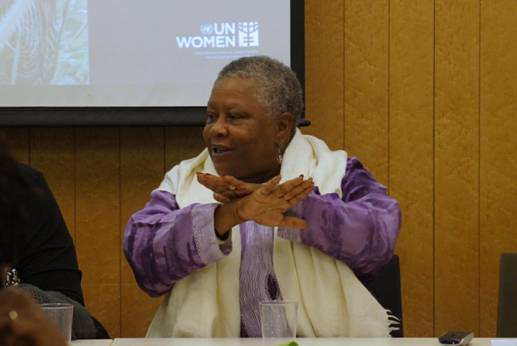
Etweda “Sugars” Cooper addresses audience at CSW side event on women and natural resource management in Libera. Credit: Lusha Chen/IPS
A new report (Women and Natural Resources – Unlocking the Peacebuilding Potential) by UN Women, United Nations Development Programme (UNDP), United Nations Environmental Programme (UNEP) and PBSO explores the relationship between women and natural recourses, in order to strengthen women’s contribution to resolving conflict, entities should focus on how women manage, use and make decisions about natural resources
“We are the drivers of our country.” said Edtweda “Sugars” Cooper, a leader of the Liberian women’s movement who spoke during an informal meeting at the Swedish mission Wednesday afternoon.
Land in particular, is one of the most important aspects of a woman’s livelihood in Liberia and has recently been a topic of controversy as corporate companies seek economic gains within the country.
Alice “Old-Lady” Kamara, a rural women’s activist and head of the women’s “Peace Hut” in Henry’s Town, Gbarpolu County, Liberia told the story of a logging company that destroyed forests, damaged roads and ultimately polluted the water system.
The situation came to a head when Kamara and other local women took matters into their own hands and rallied against the logging company, creating a roadblock and driving them out of the town.
The women feared the destruction of their roads would prevent them from transporting goods to the market – an essential part of both their economic and social development.
This form of retaliation served as a reminder to governments and big corporations that women in Liberia view the land not only as a means to create a life, but also as an empowerment tool.
“You can’t take away our livelihood.” Cooper said, commenting on the importance of allowing women to stand up to corporations and authorities that dismiss their eligibility to manage natural resources.
“Women are skilled, we’re are managers. In Liberia, in a farming community, the woman will clear the land; she plants, she harvests, she processes, she markets the produce from the land.”
UN Women together with their counterparts in Liberia call for the recognition of women as integral land developers, managers and business owners.
Using Liberia as a success story, three major points are defined: education of women in such a way that promotes skill, literacy and empowerment, enforcement of gender sensitivity from the local level to the parliamentary level and economic investment for locally owned businesses.
After a 14-year civil war that left the country destabilized, Cooper believes no one should underestimate the strength of women in Liberia. “We bring skills to the table and those skills will help with the development of our country.” she said.
Liberia is home to over three million people and according to UN Women—about half of them are women.
UN Celebrates Cultural Diversity and Multilingualism
By Jean-Baptiste Viallet
UNITED NATIONS, Mar 21 2014 (IPS) – “We live in a multicultural world. The language we speak affects both the way we think and act,“ said Under-Secretary-General Peter Launsky-Tieffenthal, the UN Coordinator for Multilingualism, at a roundtable discussion on the occasion of the International Francophonie Day on Thursday.
The discussion focused on both cultural diversity and multilingualism, which play an essential role to spread the message of the United Nations throughout the world.
Currently, about 220 million people speak French in 77 countries that are official members of the International Organization of la Francophonie (IOF).
Panelists highlighted the importance of multilingualism for a better understanding of the contemporary world. “Multilingualism is a basic condition to the establishment of an international cooperation,” said Launsky-Tieffenthal, head of the department of public information (DPI).
He added that cooperation and common values have the power to reinforce creativity and build a more inclusive society.
Ambassador Mohammed Loulichki, Permanent Representative of Morocco to the United Nations and President of the Group of Francophone Ambassadors, stressed the need to stand up for multilingualism, which is a federative and connected process.
“Diplomacy and culture have so much in common,” he said.
Manu Dibango, a well-known Cameroonian saxophonist, singer and UNESCO Artist for Peace in 2004, underscored the contribution of artists with a view to peace.
“The constant struggle for peace still exists because war is still in place,” said Dibango. “Between peace and war, artists try to create room for dreams.”
The Chief of Cabinet of the UN High Representative for the Alliance of Civilizations, Tariq Al-Ansari,singled out the issue of cultural diversity and multiculturalism in the service of effective international action.
He said that Francophonie is not only a language; it is also about how civilizations can share and communicate with each other.
“Better languages provide better opportunities to understand each other correctly,“ Al-Ansari added. “Francophonie is a catalyst between nations,“ he stated.
By its singular network throughout five continents, and by educational, cultural and political initiatives, Francophonie contributes to the elaboration of a better comprehension between nations.
“Culture must play a stabilizing role as regards human rights and development,” said Filippe Savadogo, Permanent Representative of the IOF to the United Nations.
Quoting Léopold Sédar Senghor, Senegalese poet, politician, cultural theorist and first president of Senegal, he underlined the fact that “culture is at the beginning and the end of development.”
]]>The time is right for concerted international action on domestic resource mobilisation in the developing world. Recent high [...]]]>
The time is right for concerted international action on domestic resource mobilisation in the developing world. Recent high performance on collecting taxes and other domestic resources in developing countries shows that if properly harnessed and managed, domestic revenue can be a very important and sustainable source of long-term finance for economic development and reducing poverty.
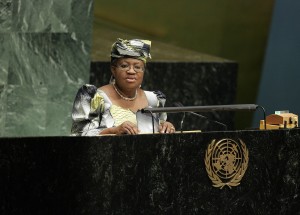
Foreign Minister Ngozi Okonjo-Iweala of Nigeria Addresses the UN General Assembly. Credit: UN Photo/Devra Berkowitz
Increasing income from domestic resources makes countries less dependent on aid, which can be highly unpredictable. Recently, aid volatility has been exacerbated by frequent fiscal challenges faced by many donor countries. More domestic financial flows would also make low and middle income countries less exposed to donor conditionality, allowing them to choose their own development priorities to meet their citizens’ needs. What’s more, mobilising domestic resources demands good governance and prudent resource management in order to meet taxpayers’ aspirations. In other words, if governments want people to appreciate the need to pay taxes, they must use the extra revenue on high-impact and result-oriented interventions to significantly reduce poverty, inequality, and unemployment and meet other social needs.
According to a recent African Development Bank report, tax revenue collection has improved in many African countries since the 1990s. Overall tax receipts in Africa increased from about 22 percent of GDP in 1990, to about 27 percent of GDP in 2007. However there was some variation across countries.
Tax revenue in low-income African countries was still below 15 percent of GDP – the conventional IMF threshold for satisfactory tax performance, and a level deemed by the United Nations to be insufficient to achieving the Millennium Development Goals.
Some problems in developing countries are illicit financial outflows, mostly due to looting by corrupt leaders and government officials, tax base erosion and profit shifting by multinationals, multiple tax incentives, informal activities not being included in the revenue base, and illicit domestic flows.
Embezzlement of public funds by corrupt officials has become disturbingly pervasive, especially in mineral resource-rich countries in Africa. Also, over-dependence on aid or on abnormal profits from natural resources can make governments oblivious to their potential to raise revenue from other sources. All involved in the Global Partnership for Development should coordinate their efforts to resolve these problems.
Effective development co-operation can boost countries’ own revenue-raising efforts by scaling up donor assistance, as well as sharing knowledge and expertise. It can help develop existing country revenue collection institutions, support reforms and improve accountability mechanisms. It should also help to track progress on institutional and capacity developments using country frameworks.
More expertise is needed for tax officials in developing countries conducting tax policy analyses and designing tax policies appropriate to local country conditions. Investing development aid in building tax systems can yield impressive returns, but only limited funds have been targeted toward this sector so far.
With donor support, developing countries’ governments can invest more in building their own technical capacities, in researching international best practices and in improving their negotiation skills to help them receive maximum benefit from new natural resource contracts. Above all, development frameworks for increasing domestic resource mobilisation should be home-driven and tailored to each country’s specific needs and circumstances, in line with the Busan Partnership Agreement’s first principle of country ownership.
Domestic resource mobilisation is one of the Global Partnership for Effective Development Co-operation’s top priorities for action at its first High-level meeting, to be held in Mexico City in April 2014. As we prepare, I call on all Global Partnership stakeholders including development co-operation providers and recipients, civil society, parliamentarians, and private businesses, to reflect on these issues. With their input, we can have fruitful dialogue to determine how the challenges of domestic resource mobilisation can be properly integrated to the post-2015 development agenda.
It is also imperative that the meeting addresses development co-operation providers’ accountability for timely delivery on their commitments to support these efforts. I believe strongly that the Mexico meeting can better position development co-operation to address the challenges of domestic resource mobilisation in low and middle income countries.
This article was originally featured on the Effective Development Co-operation Blog hosted by the Global Partnership for Effective Development Co-operation to foster constructive comment to help nations, business and organisations work better together to end poverty.
]]>Not only is women’s personal development hampered by disproportionate water-collection duties, their [...]]]>
Not only is women’s personal development hampered by disproportionate water-collection duties, their limited access to productive resources (because of gender discrimination), including irrigation, also causes lower food production overall and thus hunger in developing countries.
You want a side of statistic with that? No problem.
Investing in women-owned agriculture businesses could bring the number of the world’s hungry down by 100 to 150 million people.
Sit with that number for a second and then continue reading.
As Thalif Deen recently reported (reiterated yesterday by Lakshmi Puri, deputy executive director of UN Women) women spend more than 200 million hours per day collecting water.
That’s 40 billion hours per year.
71 percent of the water collection burden falls on women and girls.
We all know the popular media image of women water bearers, but the development loss that occurs for women in that act is rarely quantified.
Women’s disproportionate burden of fetching water limits their personal development, productive capacity and community engagement, including school attendance, market activity and their involvement in local leadership and decision-making.This also has negative effects on building and maintaining peace.
Progress has been made on improving secure water supplies in developing countries and reducing walking distances, but “783 million people still remain without access to an improved source of drinking water,” according to Puri.
She emphasised that “Creating a water- and food-secure world requires putting women and girls at the centre of water and food related policies, actions and financing.”
Rather than seeing women as “beneficiaries of greater water and food security,” they ought to be seen as contributors to greater progress.
Puri lists four urgent actions to “unleash their potential” [emphasis and formatting mine]:
1. Women need to be recognised as water managers, farmers and irrigators, who contribute to ensuring sustainable food production and consumption and to safeguarding the environment.
This must be done in laws, policies and through social awareness programmes in communities.
2. Governments and other partners need to ensure that women are empowered along the water and food supply chain, so that their food production and water management roles are supported.
Improvements in infrastructure services— especially water and electricity—can help free up women’s time spent on domestic and care work. […]
3. We need to address the multifaceted gender discriminations in accessing and controlling productive resources.
Women must be provided with technical training on water management, irrigation, rainwater harvesting, and rain-fed agriculture.
4. Women must be recognised as decision-makers in water governance.
This involves reducing membership fees and broadening the mandate of irrigation schemes to acknowledge and include multiple water users.
]]>
At the coffee plantation Monte Café, to the left of its dilapidated pink colonial buildings, stands a huge shed. The caretaker unlocks a gigantic padlock and we step into a surreal [...]]]>

Ghost factory. By M. Sayagues
At the coffee plantation Monte Café, to the left of its dilapidated pink colonial buildings, stands a huge shed. The caretaker unlocks a gigantic padlock and we step into a surreal décor for a tropical Blade Runner movie.
The shed houses a web of pipes and drums, coffee-processing machinery made by the Brazilian company Pinhalense. It is huge, complex – and never used.
The caretaker remembers when the machines were put in place, about a decade ago, but he never saw them working.
Donors pulled the plug on this US$24 million project after US$14 were spent and a few siphoned off.
The project was sponsored by ESAGRI, the agricultural arm of the Portuguese group Espirito Santo, with US$10.9 from the African Development Bank, totalling US$13 in foreign aid.
I went with a coffee grower who groaned at all the inappropriate elements: for example, a wasteful layout and excessive drying capacity for the production of the 1,800-hectares plantation. The optical scanner for bean selection made him laugh: it required a dust-free, air-conditioned environment, not the dust, humidity and power cuts of Sao Tome.
Going back to the capital after 4 pm, there were no taxis so I start walking. A man in a 4×4 offers me a ride. He is a businessman in his fifties and he insists on showing me his failed textile factory.
In the 1980s, it produced trousers and shirts for both the local market and for Angola, following an agreement between the two allied Marxist governments. When Angola liberalized its economy in the late 1990s, the contract was cancelled and the factory closed.
“Naively, we thought the contract would go on forever and did not look for other markets,” he explained.
Another padlock, another eerily silent space, a 2,000 sq.metres building with rows of old sewing machines.
Two ghost factories: one, the failure of a donor-funded development project. The other, a failure of the post-colonial regime’s industrialisation drive.
Provocative analysis

Improductive from Day One. By M. Sayagues
Africa is littered with abandoned industrial parks and two new, thought-provoking books explain why.
In Dead Aid, Zambian economist Dambisa Moyo argues that foreign aid to Africa has discouraged free enterprise while fuelling corruption and rent-seeking, defined as the use of governmental authority to make and take money without trade or production of wealth.
Aid, she says, lowers the incentive for investment and chokes off growth.
Because aid flows are seen as permanent income, policymakers have no incentive to look for other ways of financing development. Worse, they have no sense of urgency “in remedying Africa’s critical woes.”
In Architects of Poverty, South African author Moeletsi Mbeki argues that African elites obstruct the development of an indigenous entrepreneurial class, seen as a threat to their power. (Read an interview here).
Instead, elites entrench themselves as a “parasitic bureaucratic bourgeoisie…unproductive but wealthy black crony capitalists” who live off state revenues, ignore or exploit peasants, and divert profits to elite consumption or capital flight.
Mbeki notes that one of the biggest scandals is the underinvestment in transport in Africa.
Long wait
The 70 kms drive from Sao Tome to Porto Alegre on the south of the island takes 5 hours and a sturdy car to negotiate potholes.
Few minibuses ply this route because drivers don’t want to destroy their cars. So the trip from Porto Alegre to the capital turns into a day-long journey. That hurts tourism, trade and travel.
Since 7 am, Alice Tavares waited for a bus with her 2 young children and a neighbour’s teenager. They carried school satchels, two baskets of fish, five bundles of clothes and two jerry cans of petrol.
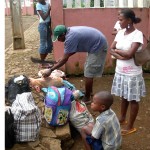
Patient Alice buys a pig. M. Sayagues
The early minibus was full. The second arrived at noon and went half-way to Angolares, where we waited for three hours. Alice bought a freshly butchered pig and stuffed it in a plastic bag. I took photos. We got to the capital after sunset.
How hard can it be to maintain a total of 320 kms of roads in the tiny islands? Since 2007, small billboards brag about a European Union aid project to improve roads. What a joke. Looks more like dead aid managed by the architects of poverty.
]]>Instead of striking a balance between ambition and realism, the MDGs have become [...]]]>
Instead of striking a balance between ambition and realism, the MDGs have become “money-metric and donor-centric”, “meaningless catch-all phrases.”
So says Jan Vandemoortele, a Belgian national, a United Nations senior official and one of the architects of the MDGs, in a thought-provoking article in the July issue of Development Policy Review of the Overseas Development Institute. (read it here)
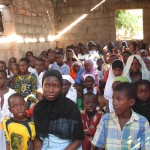
Unrealistic goal? A crowded classroom in Guinea Bissau...
The author recalls that the MDGs were set up in 2000 as collective targets based on extrapolations of global trends. They are vague by definition; they are not one-size-fits-all.
Instead, one should look at countries’ historical backgrounds, natural endowments and specific problems, then adapt the Goals to each circumstance, as Mozambique, Cambodia and Ethiopia have done.
Otherwise, this puts undue pressure on the poorest countries and, given that most of these are in Africa, nurtures Afro-pessimism.
For example, the global target for education “is not realistic” for countries in conflict, he says.
True, targets do change. For example, water for all in 2015 morphed into the more feasible goal of halving the number of people without clean water.
Magic numbers
A mantra has evolved: if only there were more money and higher economic growth, the MDGs would be achieved. Who is fond of these “magic numbers”? Staff at global headquarters of aid organisations, says the author, because of their “excessive reliance on abstract concepts.” (he should know, with his long career as a top UN official).
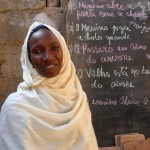
..and their teacher. By M. Sayagues
Vandemoortele sees the MDG canon being usurped by interest groups to push their agendas or devalued “as a repackaged call for more foreign aid.”
Rather, the MDG should be a tool to examine disparities and inequities within countries. In his view, the poorest people continue to be excluded. Many of these are women. Without better sex-disaggregated data, the gender dimension of hunger, illiteracy, disease and poverty remains unexposed.
Most progress takes place among the better off, and inequality and inequity keep rising, says the author.
“The targets are often presented as a universal good that will not demand tough policy choices and hard trade-offs among social groups within a country,” he says.
The MDGs should usher in new thinking about inequalities if they are not to miss the point
What do you think? Send us your views.
]]>